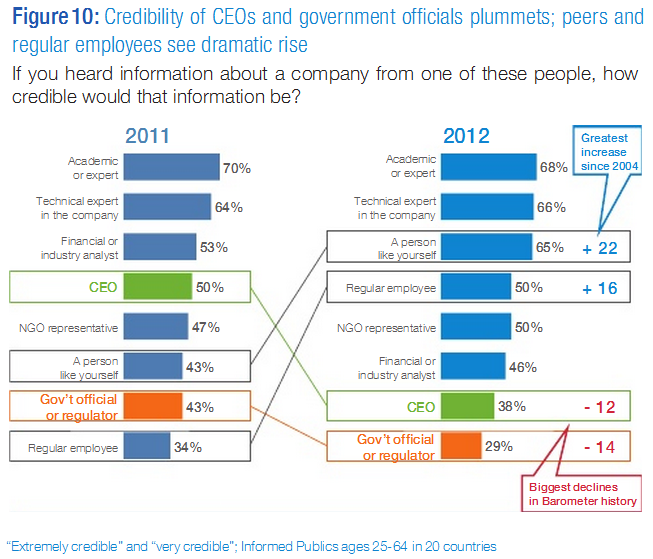Regular employees and “people like me” are once again among our top three most trusted, credible sources, according to the 2012 Edelman Trust Barometer.
They’re back in the limelight after fading away last year, somehow losing ground to CEOs. But this year, things look much as they did in 2004, when regular folk vaulted to the top of the heap of credible spokespeople.
In health communication, the Regular Joe or Jane has continuously held a starring role. While we defer to medical professionals for information about health treatment, Susannah Fox of the Pew Internet & American Life Project has written that we look to people in our shoes — people like me — for emotional support and empathy, encouragement and care. This is particularly true for those who are living with a chronic condition, are acting as caregiver, or have experienced a medical crisis. It’s also true for those who have gained weight, had a pregnancy, or quit smoking.
Employers need to provide a connection
This is a distinction that matters. Employees who have the medical guidance they need still benefit from finding others who have been in their shoes. It’s up to employers to determine ways to provide that connection.
 Employers can steer employees to people like them. there are powerful examples of patient communities — patientslikeme and curetogether being two well-known examples. They can create avenues for employee-to-employee sharing, through blogs, forums and various forms of success story sharing.
Employers can steer employees to people like them. there are powerful examples of patient communities — patientslikeme and curetogether being two well-known examples. They can create avenues for employee-to-employee sharing, through blogs, forums and various forms of success story sharing.
And last, they can equip “Regular Joes and Janes” to go, to find, and to offer support and guidance to others like them, whether that’s those trying to make small, healthy changes or those dealing with something graver.
Where to find support
Here are a few examples from employers and elsewhere.
What’s Your Inspiration? A simple success story-sharing process for Home Depot employees that mimics popular approaches by Weight Watchers, Shape magazine, and many others.
Love Heals: A peer-to-peer video counseling program for teen girls about safe sex (hat tip: Susannah Fox).
Bedsider Real Stories: Video stories from men and women about different contraceptive methods.
Ron Artest on psychiatry: An informal video interview where the Los Angeles Lakers’ newly named Metta World Peace (formerly Ron Artest) thanks his psychiatrist for making his achievements possible.
Tudiabetes’ Word in Your Hand Project: A photo-sharing project to connect others through their shared emotional experience living with diabetes. (Note: this project morphed into the global diabetes handprint, whose site is sadly no longer available.)
Fran Melmed will be speaking on “The Second-Generation Workplace Wellness Program” at the TLNT Transform conference in Austin, TX Feb. 26-28, 2012. Click here for more information on attending this event.
This was originally published on Fran Melmed’s free-range communication blog.
